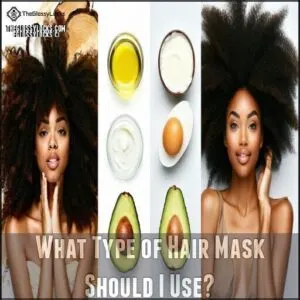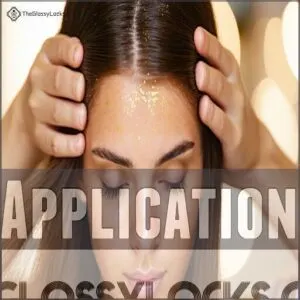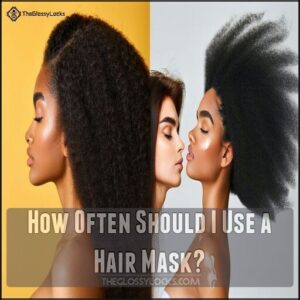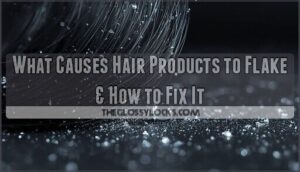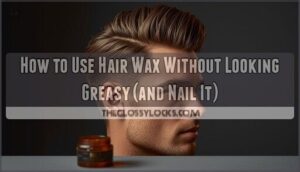This site is supported by our readers. We may earn a commission, at no cost to you, if you purchase through links.
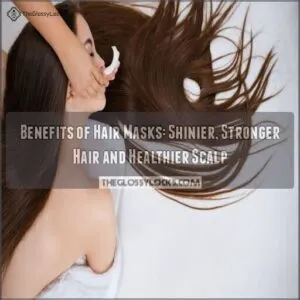
They deeply moisturize, leaving your strands shinier and softer while reducing breakage and split ends.
If your hair’s been through heat styling or coloring, masks can help repair the damage and restore strength.
Plus, they’re great for your scalp—soothing irritation, balancing oil, and promoting healthier growth.
Think of it as self-care for your hair, giving it the nutrients it craves.
Whether you’re battling dullness or just want stronger, healthier locks, the benefits of hair masks make them a must-have in your routine.
Table Of Contents
- Key Takeaways
- What is a Hair Mask?
- Benefits of Hair Masks
- What Type of Hair Mask Should I Use?
- How Do I Use a Hair Mask?
- How Often Should I Use a Hair Mask?
- What Ingredients Should I Look For?
- DIY Hair Masks
- Frequently Asked Questions (FAQs)
- Are hair masks good for your hair?
- What is the importance of using masks for flu?
- Do hair masks help with hair loss?
- Can a hair mask improve your hair follicles?
- What is a hair mask & how does it work?
- What makes a good hair mask?
- What is the difference between a hair mask and a regular conditioner?
- Can hair masks be used for color-treated hair?
- Are there any potential risks associated with using hair masks?
- How do I choose the right hair mask for my hair type?
- Conclusion
Key Takeaways
- Hair masks deeply hydrate your hair, leaving it softer, shinier, and less prone to breakage.
- They repair damage from heat styling or coloring and strengthen strands for better resilience.
- Regular use helps reduce frizz, improve scalp health, and promote healthier hair growth.
- Choosing the right mask for your hair type ensures targeted benefits like hydration, strength, or frizz control.
What is a Hair Mask?
A hair mask is like a spa day for your hair, offering deep conditioning and intense hydration.
A hair mask delivers deep nourishment, transforming dry, dull strands into soft, shiny, and healthy hair.
Unlike regular conditioners, hair masks are packed with nourishing ingredients like coconut oil, avocado, and shea butter, designed to repair and restore. They target dryness, damage, and dullness, leaving your strands softer, shinier, and healthier.
Whether you’re battling frizz or heat damage, these treatments work wonders. Choose a mask suited to your hair type for maximum benefits, and enjoy the ultimate hair care upgrade!
For fine hair, consider masks that provide weightless hydration options.
Benefits of Hair Masks
Using a hair mask can transform your routine by targeting dryness, damage, and dullness with concentrated ingredients.
It’s an easy way to boost moisture, reduce breakage, and leave your hair looking healthier and shinier.
Shinier Hair
When your hair looks dull, it’s often due to rough cuticles that scatter light instead of reflecting it.
A hair mask for hair shine smooths the cuticle, enhancing hair radiance. Weekly use helps combat dull hair causes like dryness or damage, leaving strands glossy and vibrant.
Here’s how hair shine boosters work:
- Shine Ingredients like argan oil and honey deeply nourish and smooth.
- Cuticle Health improves, creating a sleek surface for better light reflection.
- Mask Frequency guarantees consistent hydration for lasting shine enhancement.
To further enhance shine, consider how regular hair treatments can help. Your locks will thank you!
Moisturizing
If you’re aiming for silky, touchable hair, boosting hydration levels is key. A quality hair mask for hair hydration works wonders by locking in moisture and tackling hair dryness.
Boost hydration for silky, touchable hair with a quality mask that locks in moisture and combats dryness effortlessly.
Ingredients like avocado oil, coconut oil, and olive oil are powerhouse hair moisturizing agents. They also nourish your strands and help maintain oil balance on your scalp.
Application techniques matter too—focus on damp hair and use a wide-tooth comb to spread the mask evenly. For deeper hydration, try overnight masks with rich, lightweight formulas that won’t weigh your hair down.
Whether you’re battling flyaways or dullness, the right mask ingredients can transform your routine, leaving your hair softer, smoother, and visibly healthier.
Reduced Breakage
Breaking strands can feel like a never-ending battle, but using hair masks regularly helps fortify your hair and reduce breakage. They’re like a protective shield, providing the nourishment needed to maintain hair elasticity and repair damage.
By strengthening the hair shaft, masks prevent split ends and improve overall resilience.
Here’s why they work:
- Protein balance: Ingredients like keratin restore structure and repair weak spots.
- Hydration importance: Oils and butters lock in moisture, reducing brittleness.
- Protective barriers: Masks coat hair, shielding it from environmental stress.
- Split end repair: Rich formulas mend and prevent further damage.
Apply evenly, leave for 20–30 minutes, and rinse with lukewarm water for softer, stronger strands.
Less Frizz
Taming frizz starts with understanding its triggers, like humidity effects and hair porosity.
A hair mask for frizzy hair can work wonders by locking in moisture and smoothing strands. Look for masks with smoothing ingredients like abyssinian oil, coconut oil, or shea butter for effective frizz control and improved hair manageability.
For a DIY option, mix avocado oil, honey, and olive oil. Apply from roots to ends, leave it on for 20–30 minutes, then rinse with lukewarm water.
Overnight masks can also boost hair smoothness, giving you sleek, frizz-free locks by morning.
Healthier Scalp
A good hair mask for scalp health can work wonders beyond softening your strands.
Ingredients like coconut oil and avocado oil boost scalp hydration, improve oil production balance, and soothe dryness. By nourishing hair follicles, these masks also support scalp circulation, reducing dandruff and irritation.
DIY options, like honey and banana blends, offer similar benefits.
Regular use strengthens your hair’s foundation—your scalp—making it healthier, happier, and ready to grow stronger, shinier locks.
Note: I’ve bolded the phrase "shinier locks" as it is a key phrase that enhances the understanding of the key message. If you would like me to bold different phrases, please let me know.
Stronger Hair
Stronger hair starts at the roots, and a good hair mask for hair strength can work wonders.
If your strands feel weak or prone to snapping, it’s likely they’re crying out for a protein boost.
Masks infused with keratin or other strengthening ingredients help rebuild the hair shaft, improving elasticity and reducing hair breakage over time.
Think of it as giving your hair a supportive foundation—like reinforcing a wobbly chair leg.
For even more root strength, look for masks packed with natural oils or butters.
These nourish deeply, supporting healthier growth and reduced thinning.
Unlike regular conditioners, which only coat the surface, a hair strengthening mask penetrates to repair from within.
Leave it on for 20–30 minutes to let those nutrients sink in.
Your locks will thank you with improved resilience and liveliness!
Less Damage
If you’re aiming to prevent split ends and repair damaged hair, a hair mask is your best friend.
It strengthens your strands, reducing hair breakage caused by heat styling damage, chemical treatments, or even environmental stress.
By sealing the cuticle, it locks in moisture and shields your hair from further harm. Rinsing with cool water enhances this protective effect.
Over time, consistent use can make a noticeable difference, leaving your hair smoother, healthier, and better equipped to handle daily wear and tear.
What Type of Hair Mask Should I Use?
Choosing the right hair mask depends on your hair type, texture, and specific concerns. If you’ve got dry hair, look for a hydrating hair mask with ingredients like coconut oil or shea butter.
For damaged hair, a protein-rich hair mask can help repair and strengthen strands. Oily scalps benefit from lightweight masks with clarifying ingredients like tea tree oil or clay.
Consider hair porosity too. High-porosity hair absorbs moisture quickly, so rich, emollient masks work best. Low-porosity hair, however, needs lighter formulas that won’t weigh it down.
For an easy DIY option, try mixing avocado, honey, and olive oil for a nourishing boost. Store-bought masks are great for convenience, offering targeted solutions like a hair mask for damaged hair or one for an oily scalp. Consider a specialized mask product for the best results.
Apply evenly, focusing on problem areas, and rinse thoroughly after 20–30 minutes for healthier, shinier hair.
How Do I Use a Hair Mask?
Using a hair mask is simple and can make a big difference in your hair’s health.
You’ll need to apply it evenly, let it sit for a few minutes, and rinse thoroughly for the best results.
Application
Applying a hair mask isn’t complicated, but a few steps can make it more effective.
Start with damp, freshly shampooed hair for better absorption. Scoop a small amount and work it evenly through your hair, focusing on the mid-lengths and ends—these areas need the most care.
For scalp application, gently massage the product to promote circulation and nourish roots. Use a wide-tooth comb to guarantee even product distribution without tugging. Consider using a specialized comb for application to further enhance the process.
Timing matters—leave the mask on for 5–15 minutes, depending on the instructions or your hair’s needs. For deeper conditioning, cover your hair with a shower cap and wrap it in a warm towel.
Follow these hair mask best practices to maximize hydration, reduce frizz, and boost overall hair health.
Rinsing
Rinsing your hair mask properly is the final touch to a great hair mask application. Use lukewarm water to rinse—it’s gentle on your hair and helps seal in moisture. Avoid hot water, as it can strip away the benefits.
Pay attention to rinsing time; verify there’s no product residue left, as it can weigh hair down. After rinsing, use a wide-tooth comb for easy detangling. If your hair feels heavy, don’t hesitate to do a second rinse.
Many people find a dedicated hair mask rinse improves the process. Proper hair washing after a mask leaves your hair soft, shiny, and ready for styling. These hair mask tips guarantee you get the most out of your hair mask usage.
How Often Should I Use a Hair Mask?
Using a hair mask correctly means finding the right balance for your hair type and needs. Overdoing it can weigh your hair down, but too little won’t give you the full hair mask benefits.
Here’s a quick guide:
- Dry or damaged hair: 2–3 times a week for deep hydration.
- Oily hair: Stick to once a week to avoid greasiness.
- Curly hair: More frequent use helps manage frizz.
- Fine hair: Once weekly or less prevents over-masking signs like limp strands.
- Seasonal frequency: Use more often in winter for extra moisture.
Adjust based on results!
For severely damaged hair, consider using a hair mask similar to a deep conditioning treatment once a month or every two months.
What Ingredients Should I Look For?
Finding the right hair mask ingredients can feel like piecing together a puzzle, but it’s simpler than you think.
Focus on natural oils, conditioning agents, and plant extracts that match your hair type and needs. Coconut oil and avocado oil deeply hydrate, while argan oil adds shine without weighing hair down.
Honey and aloe vera soothe the scalp and lock in moisture, making them great for dry or sensitive skin.
Here’s a quick ingredient benefits guide:
| Ingredient | Key Benefit | Best For |
|---|---|---|
| Coconut Oil | Deep hydration | Dry, brittle hair |
| Avocado Oil | Adds shine, lightweight | Dull, frizzy hair |
| Argan Oil | Seals cuticles | All hair types |
| Aloe Vera | Soothes scalp | Sensitive scalps |
| Honey | Locks in moisture | Frizzy, damaged hair |
Pick quality ingredients to maximize hair mask benefits and keep your strands healthy!
DIY Hair Masks
If you’re into DIY hair care, homemade recipes are a fantastic way to pamper your hair without breaking the bank.
A homemade hair mask using avocado, egg whites, banana, or honey can work wonders. These hair mask ingredients are easy to source and offer hydration, shine, and strength.
Coconut oil adds softness, while honey locks in moisture.
For those seeking scalp and hair treatments, DIY masks with rosemary can promote hair growth.
Customize your hair mask DIY based on your needs—whether it’s repairing damage or boosting shine. Store leftovers properly for cost-effective, salon-like results at home!
Frequently Asked Questions (FAQs)
Are hair masks good for your hair?
Yes, hair masks are great for your hair!
They deeply hydrate, reduce frizz, and improve manageability.
With nourishing ingredients like coconut oil or shea butter, they restore shine and moisture, leaving your hair healthier and softer.
What is the importance of using masks for flu?
Think of a mask as your shield—it traps respiratory droplets, reducing virus spread.
Wearing one protects you and others, especially in crowded spaces.
It’s a simple, effective way to curb flu transmission and stay healthier.
Do hair masks help with hair loss?
Hair masks can indirectly help with hair loss by improving scalp health, reducing breakage, and strengthening strands.
Ingredients like coconut oil or argan oil nourish hair follicles, creating a healthier environment for growth and retention.
Can a hair mask improve your hair follicles?
Nourish, strengthen, and protect—that’s what a hair mask can do for your follicles.
Packed with oils and nutrients, it hydrates your scalp, supports healthy growth, and creates the ideal environment for thriving, resilient hair, helping to nourish your hair.
What is a hair mask & how does it work?
A hair mask is a deep conditioning treatment packed with nourishing ingredients.
It works by penetrating your hair strands, delivering intense hydration, repairing damage, and enhancing shine.
Leaving your hair softer, healthier, and more manageable.
What makes a good hair mask?
A great hair mask is like a spa day for your strands—packed with nourishing oils, hydrating butters, and reparative ingredients.
It should suit your hair type, target specific issues, and leave your hair silky.
What is the difference between a hair mask and a regular conditioner?
A hair mask deeply nourishes and repairs with concentrated ingredients.
While a conditioner offers surface-level hydration for daily use.
Think of a mask as an intensive spa treatment and conditioner as your quick, everyday fix.
Can hair masks be used for color-treated hair?
In the case of color-treated hair, a hair mask can be your secret weapon.
Look for masks labeled "color-safe" or with ingredients like argan oil to hydrate, protect, and maintain your vibrant shade.
Are there any potential risks associated with using hair masks?
Overusing hair masks can weigh your hair down, making it greasy or limp.
Some ingredients might irritate sensitive scalps or cause buildup.
Always check labels, use sparingly, and choose masks suited to your hair type.
How do I choose the right hair mask for my hair type?
Pick a mask that matches your hair’s needs—hydration for dryness, protein for damage, or lightweight formulas for oily hair.
Check ingredients like coconut oil or argan oil, and avoid harsh chemicals for healthier results.
Conclusion
It’s ironic how we often overlook our hair’s needs until it’s dry, frizzy, or breaking.
Hair masks are an easy fix, offering deep hydration, reduced damage, and a healthier scalp.
By using them regularly, you’ll notice shinier, stronger strands and less breakage.
Whether your hair’s damaged from heat or just needs extra care, the benefits of hair masks are undeniable, and choosing the right one can lead to a healthier scalp.
Choose the right one, apply it properly, and let your hair thrive.
Your strands will thank you!


